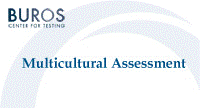Buros-Nebraska Series on Measurement and Testing

Multicultural Assessment in Counseling and Clinical Psychology
Date of this Version
Spring 1996
Document Type
Book Chapter
Citation
Published in Multicultural Assessment in Counseling and Clinical Psychology, edited by Gargi Roysircar Sadowsky and James C. Impara (Lincoln, NE: Buros Institute of Mental Measurements, University of Nebraska–Lincoln, 1996).
Abstract
Since the publication of the position paper on cross-cultural counseling competencies of the Education and Training Committee of the American Psychological Association's Division of Counseling Psychology (Division 17; Sue, Bernier, Durran, Feinberg, Pedersen, Smith, & Vasquez-Nuttall, 1982), a great deal has been written about the need for increased training in cross-cultural counseling. Many textbooks and journal articles on multiculturaP counseling theories and techniques have been published to provide guidance to trainers (e.g., D'Andrea, Daniels, & Heck, 1991; Leong & Kim, 1991; Pedersen, 1987, 1988; Sue & Sue, 1990) in the provision of services to counselor trainees. As a result, there seems to be some general agreement that all multicultural counseling training programs should provide experiences that allow trainees to develop competencies in three broad areas identified by Sue et al. (1982): (a) beliefs-attitudes, (b) knowledges, and (c) skills. More recently, these competency areas have been further elaborated by Sue, Arredondo, and McDavis (1992) to include (a) counselors' awareness of their own assumptions, values, and biases; (b) an w1derstanding of the worldview of the culturally different client; and (c) the development of appropriate intervention strategies and techniques.
Together with the interest in theory and practice of multicultural counseling training is a growing interest in assessment of training effectiveness. It is within the three broad areas of awareness, knowledge, and skills that the majority of work in multicultural counseling competency assessment has been directed. Ponterotto, Rieger, Barrett, and Sparks (1994) reviewed four assessment instruments currently in use, identifying the strengths and limitations of each from a psychometric perspective. Three of the instruments (Cross-Cultural Counseling Inventory-Revised, LaFromboise, Coleman, & Hernandez, 1991; Multicultural Counseling Awareness Scale- Form B, Ponterotto, Sanchez, & Magids, 1991; Multicultural Counseling Inventory, Sodowsky, Taffe, Gutkin, & Wise, 1994) are based explicitly on the cross-cultural competencies identified by Sue et al. (1982), whereas the fourth (Multicultural Awareness-Knowledge-and-Skills Survey, 0' Andrea et al., 1991) assesses competencies in these three broad categories without specific reference to the position paper. Yet, despite the specification of broad competency areas and the focus on assessment of multicultural competencies within these areas, "there is no clear consensus as to what constitutes a good multicultural training program and how the effects of such training are to be empirically assessed" (Ponterotto et al., 1994, p. 316).
While the debate regarding content and method of multicultural counseling training continues, there is a need to identify specific factors that may impact the development of multicultural competencies of trainees across training modalities. Utilizing survey methods, Pope-Davis and his colleagues have attempted to identify such factors across a variety of training situations using the Multicultural Counseling Inventory (MCI). The remainder of this chapter will examine the MCI as a tool for measuring multicultural counseling competencies based on results from the Pope-Davis studies. First, reliability of the MCI will be examined in comparison to the original Sodowsky et al. (1994) data. Next, results from the studies will be examined to identify variables associated with self-reported multicultural competencies. The chapter will then conclude with a discussion of implications for training and education as well as suggestions for future research.


Comments
Copyright © 1996 by Buros Institute of Mental Measurements. Digital edition copyright © 2012 Buros Center for Testing.